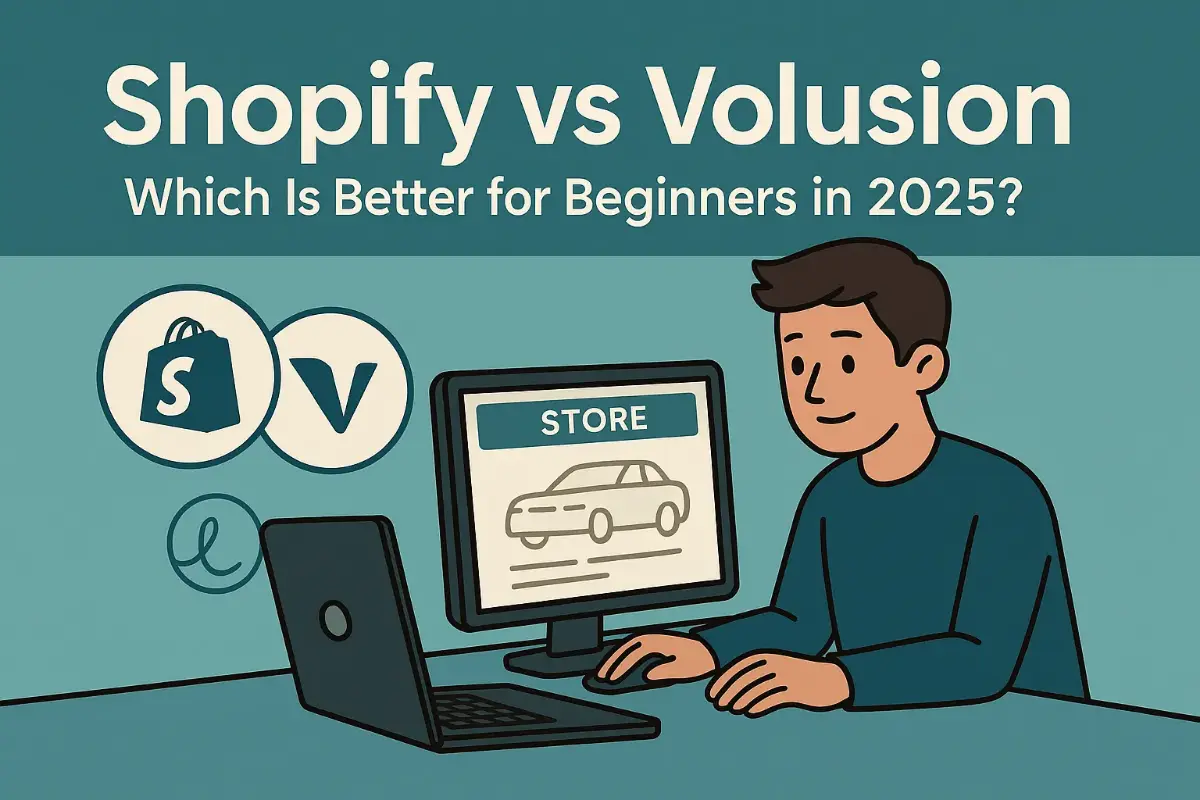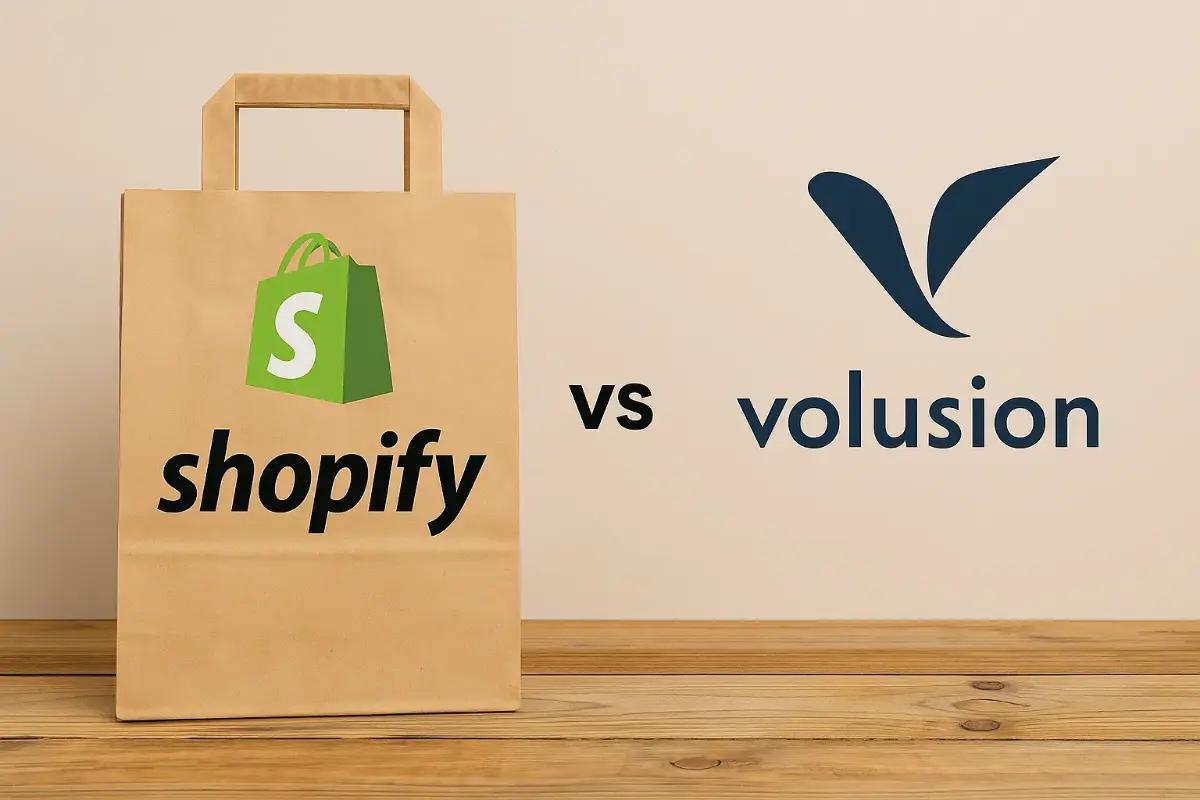Shopify vs Volusion: Which Is Better for Beginners in 2025?
Shopify and Volusion both promise to help you sell online, but which is best for beginners in 2025? I break down the differences, costs, pros and cons, and share my honest take.

When I was first exploring e-commerce platforms, I kept seeing Shopify everywhere. But then I stumbled across Volusion, which has actually been around longer than Shopify. At first, I thought: “If it’s been around this long, it must be good, right?”
The more I dug into it, the more I realized this wasn’t just about comparing features. It was really about figuring out which platform makes sense for beginners — people like me who don’t have coding experience, don’t want endless headaches, and just want to start selling.
In this guide, I’ll share what I found when comparing Shopify and Volusion: what each does well, where they fall short, and my honest take on which one is the better option if you’re starting an online store in 2025.
The Big Picture: Shopify vs Volusion
At their core, Shopify and Volusion both promise the same thing: a way to create an online store and sell products without needing to build a website from scratch. But how they go about it is pretty different.
- Shopify is one of the most popular e-commerce platforms in the world. It’s modern, beginner-friendly, and has a huge ecosystem of apps and integrations. It’s like moving into a new apartment that already has smart locks, fast Wi-Fi, and room to grow.
- Volusion has been around since 1999 and was one of the original e-commerce platforms. It still works, but it feels a little dated compared to Shopify. Think of it like renting an older, well-kept apartment — functional, but missing some of the modern features you’d expect today.
For beginners, the key difference is this: Shopify is built to make things simple and scalable, while Volusion can feel more clunky and limited.
Shopify at a Glance
When I first signed up for Shopify, I was surprised at how beginner-friendly it actually was. I expected a steep learning curve, but the dashboard felt more like filling in a form than coding a website. Within an hour, I had a basic store live — not perfect, but good enough to feel real.
The pros:
- Clean, modern interface that’s easy to navigate.
- One-click integrations for payments, shipping, and apps.
- A huge theme store so you can make your shop look professional even if you’re not a designer.
- Scales with you — from a side hustle to a full-time business.
The cons:
- Monthly cost (starting at about $25).
- You’ll need to drive your own traffic through SEO, social, or ads.
- Some features require paid apps, which can add up.
Volusion at a Glance
Volusion was one of the first names in e-commerce software, which I think is why it still pops up today. It has the core features you’d expect: product listings, inventory tracking, payment options, and analytics. On paper, it checks a lot of boxes.
The pros:
- Solid product management tools (variants, stock tracking, etc.).
- Built-in analytics for sales and traffic.
- Decent customer support options.
The cons:
- The interface feels outdated and less intuitive compared to Shopify.
- Limited themes and fewer customization options.
- Smaller app ecosystem, which means fewer integrations with the tools beginners often use.
- Pricing starts higher than Shopify, with fewer features included at the entry level.

Side-by-Side Comparison: Shopify vs Volusion
When I was researching Shopify and Volusion, I found that looking at features one by one made the decision way clearer. Here’s how they stack up in the areas that matter most to beginners:
1. Setup & Ease of Use
- Shopify: Getting started feels smooth. You pick a theme, customize it with drag-and-drop, and you’re ready to add products. I had my first store online in under an hour.
- Volusion: The setup feels more technical. The dashboard isn’t as intuitive, and I found myself clicking around trying to figure out where things were. It works, but it doesn’t feel as beginner-friendly.
2. Costs & Fees
- Shopify: Starts at around $25/month. Transaction fees apply unless you use Shopify Payments. No listing fees, which is great if you plan to sell a lot of products.
- Volusion: Starts at $35/month, and higher tiers can run up to $299/month. You also face transaction fees and product limits on lower plans.
3. Features & Apps
- Shopify: This is where Shopify shines. There are thousands of apps for marketing, dropshipping, inventory, analytics, and more. If there’s a feature you want, chances are there’s an app for it.
- Volusion: Core features are fine — you can manage products, track stock, and process payments. But the app marketplace is tiny compared to Shopify, which makes it harder to expand your store.
4. Design & Branding
- Shopify: Dozens of professional themes (free + paid), all mobile-friendly. You can customize your store to look unique and match your brand.
- Volusion: Limited theme selection, and the designs feel dated. Customizing them isn’t as smooth either.
5. Marketing & SEO
- Shopify: Built-in SEO tools, plus easy integration with Google Analytics, Facebook Ads, email marketing platforms, and more. You also own your customer data, which is huge for long-term growth.
- Volusion: Has some SEO basics (meta tags, titles), but the marketing integrations feel limited. Not as strong if you plan to scale traffic through multiple channels.
6. Scalability & Growth
- Shopify: Designed to grow with you. You can add staff accounts, sell in person with POS, and expand to global sales. If your store takes off, Shopify can handle it.
- Volusion: It can scale to a point, but the outdated feel and fewer integrations make it harder to keep up with bigger operations.
Comparison Table

My Beginner Take: Which Should You Choose?
When I looked at Shopify and Volusion side by side, the choice honestly felt pretty straightforward. Volusion might have been a strong contender back in the early 2000s, but compared to Shopify today, it feels clunky and dated.
As a beginner, I want things to be simple. I don’t want to spend hours figuring out where to click just to add a product or customize a theme. Shopify nails this — the setup is smooth, the dashboard makes sense, and if I want to add features later, the app store has almost everything I could think of.
With Volusion, I felt like I was forcing myself to use a tool that wasn’t designed with beginners in mind. The product management is fine, but the design options are limited, and the whole experience feels stuck in the past.
The only case I could see Volusion making sense is if you already have experience with it or prefer sticking with an older platform you’re familiar with. But for 99% of beginners starting fresh in 2025, Shopify is the better bet.
Tips for Choosing Your Platform
When I was first comparing platforms, I kept overthinking the decision. I’d read one review that said Volusion had great analytics, then another that said Shopify was the only way to go. In the end, I realized the “right” choice depends less on features and more on what you actually need right now.
Here are a few tips that helped me:
- Be clear on your goals. If you just want to test whether your product idea has legs, almost any platform will do. But if you want to build a long-term brand, go with the one that scales (that’s Shopify).
- Don’t chase the cheapest option. I wasted weeks early on trying to save a few dollars a month, only to end up migrating later. A platform that grows with you is worth paying for.
- Think about support and community. Shopify has an enormous community of tutorials, apps, and user forums. Volusion’s community is much smaller, which can make troubleshooting harder.
- Trial before you decide. Both Shopify and Volusion offer free trials. Spend an hour building a test store on each — you’ll quickly feel which one is easier for you.
Final Thoughts
When I first compared Shopify and Volusion, I thought it would be a tough call. But after digging into the details, the choice became pretty clear.
Volusion still works as an e-commerce platform, but it feels outdated, harder to use, and less flexible for beginners. Shopify, on the other hand, is modern, intuitive, and built to grow with your business. Whether you’re starting a small side hustle or planning to scale into something bigger, Shopify gives you the tools and community support to get there.
If you’re brand new in 2025, my honest advice is this: go with Shopify. It’s the platform I wish I had started with, and it will save you a lot of headaches down the road.
And if you’re ready to keep learning, check out the E-commerce & Dropshipping Hub and Beginner’s Guide to Starting an Online Business for more beginner-friendly comparisons and tutorials.
